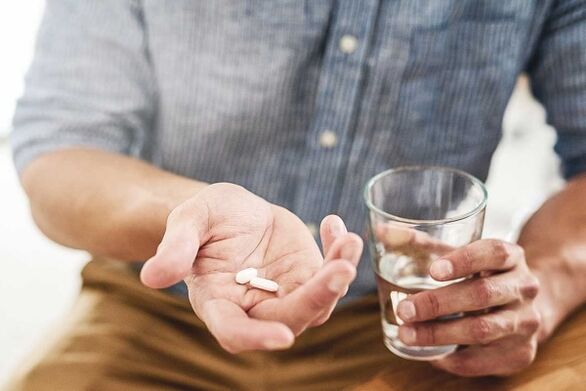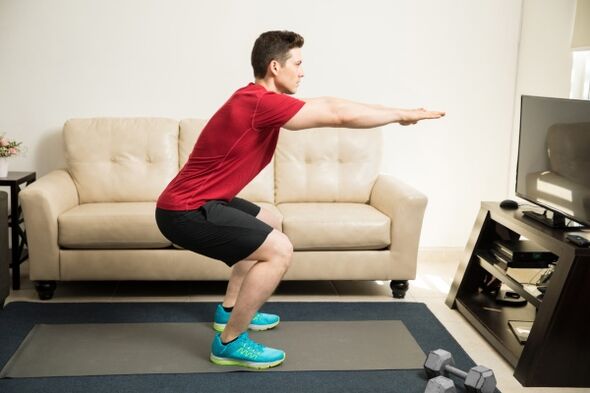Calculus prostatitis is a rare form of the disease that requires specialized treatment. Therefore, it is important to know how it arises and what signs are included. From this article you will learn all the features of this disease. As well as methods of diagnosis and treatment.
For calculus prostatitis, an inflammatory process is characteristic, in which dense structural conglomerates are formed. In other words, this is a stone located in the prostate. They are composed of elements that enter the male body. They arise in the secretions of the prostate gland against the background of chronic prostatitis, a pathological disorder.
The cause of its occurrence
Calculus prostatitis may be caused by the following:
- Infections of the genitourinary system. These can be diseases such as chlamydia, gonorrhea, trichomoniasis, ureaplasmosis, and so on. In the process of reproduction and activation of pathological microorganisms, blockages in the ducts of the prostate gland are observed, with a secretory background acquiring a thick and viscous structure. Thus, bacteria create a favorable environment for the formation of stones, and prostatolites contribute to the increase of inflammatory processes, which cause congestion in the prostate.
- Stagnation of all processes in the gland, which occurs for various reasons - the presence of adenomas (benign tumors) in the prostate, inactivity, the influence of harmful foods, alcohol abuse, tobacco smoking. But often the reason lies in the absence of frequent sexual activity, because in this case the glands are usually unable to clear the calculus, and therefore stagnation occurs.
- Urethro-prostate reflux. In this disease, urine fluid during urination in small doses is introduced into the prostate. As urine accumulates, salt crystals are released, which over time increase and thicken, turning into stones. Urethro-prostate reflux develops due to urethral injury, prostate atony, resection of the prostate gland, etc.
- Disturbed blood circulation in the pelvic organs also causes stagnation.
- Frequent hypothermia of the body and genitals.
- Failure to maintain personal hygiene leads to infection, which leads to calculus prostatitis.
- Old age. This is due to the fact that a kind of phosphoric acid and lime plaques form on the body of thickened epithelium and amyloid.
Yellowish and spherical rock formations. The minimum size of prostatolites is 0. 25 cm, maximum 0. 4. They are formed singly or multiple times, they consist of the following types: phosphate stones, oxalate stones or vein stones.
Symptoms
The following signs indicate the presence of prostatolites in the prostate:
- dull aches and pains in the perineum, groin, coccyx, scrotum;
- increased pain syndrome after physical action, bowel movements, sexual intercourse, long sitting in one position;
- sharp pain during urination;
- intermittent jets;
- frequent urging with urinary retention;
- blood particles in urine and semen;
- premature ejaculation;
- weakness of ability;
- increased body temperature;
- insomnia;
- decreased appetite;
- psycho-emotional instability.
Stages of bacterial prostatitis
- Primary or catarrhal.In the primary form, stones form in the acini of the prostate or ducts. Symptoms of the catarrhal type are less pronounced, the symptoms resembling catarrhal pathology. If you see a urologist on time and start adequate treatment, you can get rid of the disease within a week.
- Secondary or follicular.In the secondary form, the prostatolite penetrates into the organs of the kidneys, bladder and other elements of the body against the background of urolithiasis. The appearance of follicles can develop after an untreated catarrhal type. Its manifestations are acute, with an increase in body temperature and suppuration, a long duration of therapy.
- Tertiary or parenchymal.With the tertiary form, the parenchyma of the prostate gland is affected, hence it is called parenchymal (diffuse). This is the last stage of the acute course, where the symptoms are very acute. Purulent exudate forms in the inflamed area. The treatment process is long, tolerance is difficult.
Possible complications of calculus prostatitis
What complicates untreated calculus prostatitis:
- abscess on the prostate with a background of accumulation of purulent fluid in the tissues;
- body intoxication with purulent formation and further development of sepsis, which can be fatal;
- atrophy of the prostate gland and, consequently, impotence;
- vesiculitis in acute or chronic form, characterized by vasodilation of the spermatic cord, leading to impotence and infertility;
- cystitis and urinary incontinence.
To avoid such consequences, it is necessary, when there are the first signs, go to the clinic and undergo a thorough examination.
How to relieve an attack at home?
It is well understood by every sane person that during an attack it is necessary to call an ambulance brigade. But before he arrives, you can take the usual painkillers. If your home medicine cabinet contains propolis -based rectal suppositories, perform the appropriate procedure. Pain reliever and laxative tablets.
Which doctor is treating?
Urologists (or andrologists) deal with the treatment of prostatitis in any form. Other highly specialized doctors - nephrologists, infectious disease specialists and others, depending on the cause of stone formation - are also included in the process of diagnosis and selection of treatment tactics.
Diagnostics
On the first visit to the urology office, the doctor performs a palpation and visual examination, after which he collects anamnesis. Lifestyle, the presence of certain pathologies and the nature of the symptoms that exist must be taken into account. Next, the following diagnostics are performed:
- collection of blood and urine for general analysis to identify the number of units of quantitative structure (composition of biological fluids);
- semen accumulation (sperm with a calculated type of prostatitis characterized by an increase in the amount of epithelial tissue and amyloid body);
- spermogram allows you to study the level of motility and amount of sperm;
- X-ray of the prostate;
- ultrasound examination of the prostate;
- magnetic resonance imaging.
Blood collection for PSA is mandatory, which makes it possible to identify specific prostate antigens (a type of prostate gland tumor marker).
Treatment of calculus prostatitis
The duration of therapy and the selection of therapeutic measures depends on the degree of neglect of the disease, as well as the form, cause of development and the presence of complications.
Drug treatment
- Fluoroquinolone group for the destruction of pathogenic microbes, which are most often the cause of prostatitis. These are antibiotics that easily treat many pathogens.
- Penicillin group of antibacterial agents.
- Tetracycline group of antibiotics. However, tetracycline has a large number of side effects, therefore, they are prescribed more rarely than other groups.
- Cephalosporins are given intramuscularly.
- Non-steroidal anti-inflammatory drugs relieve pain syndrome, eliminating inflammation.
- Patients should take vitamin complexes to strengthen the immune system.

Surgical intervention
- Transurethral electro examination allows you to remove stones and clean blood vessels. For this, a high -frequency electric current and a resectoscope are used, which are inserted through the lumen of the urethra. The operation is not painful, but there is a possibility that the prostatolite particles will remain.
- Transurethral surgery with ultrasound guidance. Unlike the previous method. Thanks to improved ultrasound detection, all calculi were removed.
- Prostatectomy strips (stones are removed surgically) and endoscopy (using an endoscope inserted into the prostate). Along with the stones in a neglected form, performed dissection of the prostate, lymph nodes and seminal vesicles.
- Lithotripsy involves the use of lasers that crush stones, after which they are excreted naturally. For this, an endoscope is used.
Physiotherapy
- exposure to ultrasound reduces the level of inflammation, relieves pain;
- laser therapy accelerates metabolic processes in the prostate, relieves discomfort;
- magnetic therapy restores blood circulation, neutralizes swelling.
Massage normalizes the flexibility of the ducts, speeds up the blood supply, which is considered effective for prostatitis, but with the form of calculus is strictly prohibited. The reason is that the prostatolite can move throughout the body.
If you do not have the opportunity to follow the physiotherapy procedure, you can do it at home using special tools. But keep in mind that physiotherapy is effective only in remission - when prostatitis is in the stage of exacerbation, it is forbidden to use the tool.
Diet therapy
A patient diagnosed with calculus prostatitis is obliged to adhere to a special diet, developed by nutritionists at the individual level, based on the severity of the pathology.
The basis of dietary nutrition is the rejection of alcoholic and carbonated beverages, fried, smoked, salty and spicy foods. It is undesirable to use broth based on fatty meats and fish, mushrooms. Beans, radishes, carrots, garlic, cabbage, beans and onions should be excluded from vegetables. And the rest of the product leads to the formation of gas.
Physiotherapy
It is always used for prostatitis, but with the calculus form, exercise should be light to prevent stone movement. Gymnastics should stretch the perineum muscles. To do this, you can do the following exercises slowly:
- Stand up in a chair and place your hands behind your back. Lift one leg to the side, lift as much as possible. Lower the limbs. The same action is performed with the other leg. The number of approaches is 8-10.
- Stand with your back to the chair and lean back. Lift the legs alternately to your stomach, bending at the knees.
- Stretch your legs wider than your shoulders, sit up and correct your position for a few seconds. Stand up. As you exercise, try to make elastic movements in a squat position. Repeat no more than 5 times.

Folk medicine
- Eat 25-30 pumpkin seeds daily, raw and always on an empty stomach.
- Boil the herbs. You need equal parts with naked ostudnik and black letters. Set aside 1 tbsp. l. herbal ingredients, pour 0. 5 liters of "cold" boiling water, bring to a boil. Take 3 times a day, 100 mg half an hour before meals.
- Mix the root of the brown rose hips according to the recipe stated on the pharmacy package. Drink as a tea drink three times a day.
- Pour 2 tablespoons into a glass of boiling water. l. parsley seeds and simmer for 10-15 minutes over low heat. Confirm the clock. Drink up to 6 times a day, one tablespoon.
- Drink 600-1000 ml of freshly squeezed asparagus juice daily.
- Other natural juices are also useful - carrots, beets, cucumbers.
Prediction
In the treatment of calculus prostatitis, conservative therapy is initially used, the results are usually favorable. In a neglected form and in the absence of positive dynamics of drug therapy, surgery is used. In this case, the prognosis is also good. But special attention should be given during recovery to prevent infection and other complications.
Preventive measures
To prevent the development of this type of prostatitis and prevent recurrence, follow these simple rules:
- get rid of bad habits;
- seek timely medical help for any pathological disorders;
- strictly adhere to urological instructions;
- do not overdo it;
- use condoms to prevent infection;
- living an active sex life with one partner.
























